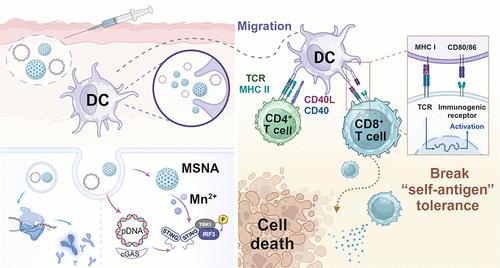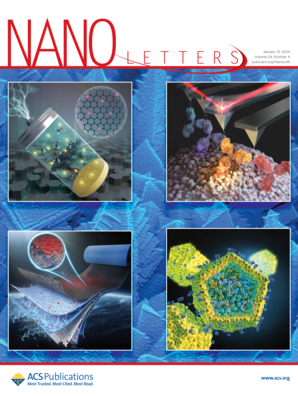STING Nanoagonist Boosts Antitumor Immunity of Therapeutic DNA Vaccines
IF 9.6
1区 材料科学
Q1 CHEMISTRY, MULTIDISCIPLINARY
引用次数: 0
Abstract
Therapeutic DNA cancer vaccines can stimulate specific immune responses against cancer antigens but often induce suboptimal therapeutic responses. Here, we demonstrate that a manganese-doped silica nanoparticle STING agonist (MSNA) enhances the immune response of plasmid DNA vaccines, promoting the activation and migration of distinct subsets of dendritic cell (DC) and improving antitumor immunity in three animal models. MSNA coadministered with an α-fetoprotein (AFP) encoded plasmid DNA (AFP-DNA) elicited significantly higher AFP-specific CD8 T cell responses than free AFP-DNA. Animals immunized with MSNA-AFP-DNA remained tumor-free in an AFP expressing hepatocellular carcinoma challenge model. MSNA combined with a DNA plasmid encoding the human papillomavirus type 16 oncoproteins E6 and E7 induced potent E7-specific CD8 T cell responses, preventing the growth of E7-expressing solid TC-1 tumors and promoting the shrinkage of E7-expressing skin grafts. These findings together demonstrate that coadministration of MSNA can improve the efficacy of therapeutic DNA vaccines targeting cancer-specific antigens.

求助全文
约1分钟内获得全文
求助全文
来源期刊

Nano Letters
工程技术-材料科学:综合
CiteScore
16.80
自引率
2.80%
发文量
1182
审稿时长
1.4 months
期刊介绍:
Nano Letters serves as a dynamic platform for promptly disseminating original results in fundamental, applied, and emerging research across all facets of nanoscience and nanotechnology. A pivotal criterion for inclusion within Nano Letters is the convergence of at least two different areas or disciplines, ensuring a rich interdisciplinary scope. The journal is dedicated to fostering exploration in diverse areas, including:
- Experimental and theoretical findings on physical, chemical, and biological phenomena at the nanoscale
- Synthesis, characterization, and processing of organic, inorganic, polymer, and hybrid nanomaterials through physical, chemical, and biological methodologies
- Modeling and simulation of synthetic, assembly, and interaction processes
- Realization of integrated nanostructures and nano-engineered devices exhibiting advanced performance
- Applications of nanoscale materials in living and environmental systems
Nano Letters is committed to advancing and showcasing groundbreaking research that intersects various domains, fostering innovation and collaboration in the ever-evolving field of nanoscience and nanotechnology.
 求助内容:
求助内容: 应助结果提醒方式:
应助结果提醒方式:


